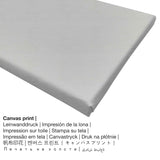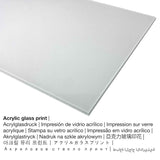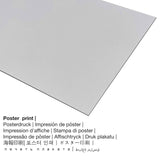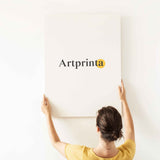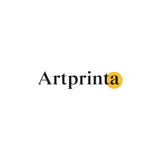William Keith, 1875 - Yosemite Valley - fine art print
Tax included. Shipping calculated at checkout.
The product
This 19th century artpiece Yosemite Valley was made by the artist William Keith in the year 1875. The over 140 year-old original measures the dimensions: 40 1/2 × 72 1/2 in (102,87 × 184,15 cm) and was painted with oil on canvas. This work of art forms part of the Los Angeles County Museum of Art's digital collection in Los Angeles, California, United States of America. We are pleased to state that this public domain artwork is being supplied with courtesy of Los Angeles County Museum of Art (www.lacma.org).: . Besides this, the alignment of the digital reproduction is landscape with a side ratio of 16 : 9, which means that the length is 78% longer than the width.
The product material choices
For every art print we offer a range of different sizes & materials. We allow you to pick your favorite size and material among the following product individualization options:
- Poster print (canvas material): A poster is a UV printed cotton canvas with a slightly rough finish on the surface, that reminds the original work of art. It is particularly designed for putting your art print with the help of a special frame. Please keep in mind, that depending on the absolute size of the canvas poster print we add a white margin of something between 2-6 cm around the print motif in order to facilitate the framing.
- Canvas print: The UV printed canvas material mounted on a wooden stretcher frame. Further, a printed canvas makes a lovely and pleasing feeling. Canvas prints are relatively low in weight, which implies that it is easy and straightforward to hang your Canvas print without any wall-mounts. Canvas prints are suited for any kind of wall.
- Metal (aluminium dibond print): An Aluminium Dibond print is a print material with an outstanding effect of depth, creating a fashionable look thanks to a non-reflective surface structure. For our Print On Aluminum Dibond, we print your chosen work of art right onto the aluminium white-primed surface.
- Printed acrylic glass (with real glass coating on top): An print on acrylic glass, often denoted as a plexiglass print, changes an original into amazing home decoration and forms a great alternative to canvas or dibond fine art replicas. The work of art will be made thanks to state-of-the-art UV direct print technology. The major benefit of an acrylic glass fine art print is that contrasts and granular artwork details become more identifiable because of the precise gradation.
Disclaimer: We try all that we can in order to depict the art products as precisely as possible and to exhibit them visually on the product detail pages. Nonetheless, the pigments of the printed materials, as well as the printing may differ slightly from the image on your device's screen. Depending on your settings of your screen and the quality of the surface, colors might not be printed one hundret percent realistically. Considering that all the art reproductions are processed and printed manually, there might as well be minor deviations in the size and exact position of the motif.
Structured article details
| Product type: | art copy |
| Method of reproduction: | reproduction in digital format |
| Production method: | UV direct print |
| Manufacturing: | manufactured in Germany |
| Stock type: | production on demand |
| Intended product usage: | art collection (reproductions), wall décor |
| Alignment of the image: | landscape alignment |
| Image ratio: | (length : width) 16 : 9 |
| Image ratio implication: | the length is 78% longer than the width |
| Available product materials: | canvas print, acrylic glass print (with real glass coating), metal print (aluminium dibond), poster print (canvas paper) |
| Canvas on stretcher frame (canvas print) options: | 90x50cm - 35x20" |
| Acrylic glass print (with real glass coating) size variants: | 90x50cm - 35x20" |
| Poster print (canvas paper) size variants: | 90x50cm - 35x20" |
| Aluminium print sizes: | 90x50cm - 35x20" |
| Framing of the art reproduction: | not available |
Background data on the piece of art
| Piece of art name: | "Yosemite Valley" |
| Classification: | painting |
| Category: | modern art |
| Century: | 19th century |
| Artwork year: | 1875 |
| Age of artwork: | more than 140 years old |
| Painted on: | oil on canvas |
| Dimensions of the original artpiece: | 40 1/2 × 72 1/2 in (102,87 × 184,15 cm) |
| Museum / location: | Los Angeles County Museum of Art |
| Place of museum: | Los Angeles, California, United States of America |
| Website: | Los Angeles County Museum of Art |
| License of artwork: | public domain |
| Courtesy of: | Los Angeles County Museum of Art (www.lacma.org) |
General background information about the artist
| Name: | William Keith |
| Aliases: | William Keith, Keith, Keith William, w. keith |
| Gender of the artist: | male |
| Nationality: | American |
| Jobs: | painter |
| Country of the artist: | United States |
| Artist classification: | modern artist |
| Age at death: | 72 years |
| Year born: | 1839 |
| Born in (place): | Oldmeldrum, Aberdeenshire, Scotland, United Kingdom |
| Year of death: | 1911 |
| Place of death: | Berkeley, Alameda county, California, United States |
© Copyright of, Artprinta.com
Description by the museum's website (© - by Los Angeles County Museum of Art - Los Angeles County Museum of Art)
In the autumn of 1872 Keith made the acquaintance of John Muir when he explored the hills beyond Yosemite with the naturalist. Yosemite Valley was a product of a later trip in 1875. A dramatic, composed image, it was painted in the artist’s studio specifically as an exhibition piece. It portrays a commanding view of Cathedral Rocks, which are in the valley along a bend in the Merced River. Nothing obstructs the panoramic view. A bit of the river bank is included as a repoussoir to lead the viewer into the scene. The towering trees are arranged on the sides to permit an open vista of the cliffs. The addition of the riders, while suggesting a narrative, was also essential to the composition. Even the pile of dead tree trunks in the center of the painting was arranged so that the large logs would link the two sides of the painting. Keith created many such epic paintings during the period between his two European trips, and many of these were criticized as too artificial. Although the general appearance of this version might give the impression of a standard picturesque composition, Keith avoided the tight, linear painting style associated with the Düsseldorf school. He also escaped the pervasive grays of such German landscapes by infusing the background of Yosemite Valley with an array of soft, opalescent hues.


